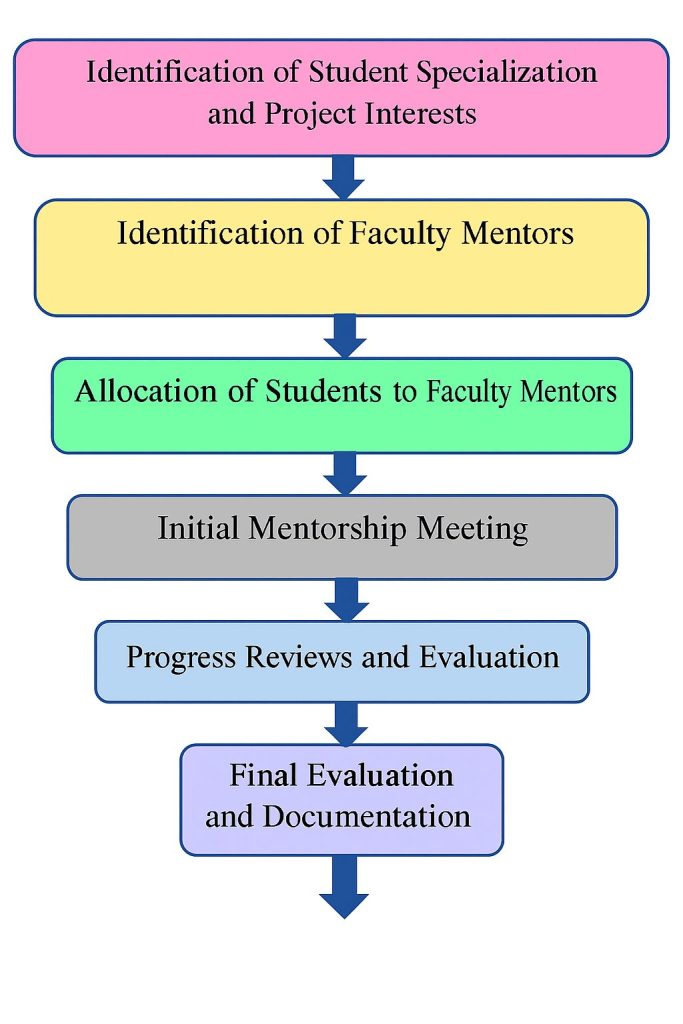Student Project Allocation
Standard Operating Procedure (SOP) for Project Identification and Allocation to Faculty Members
Purpose
The purpose of this SOP is to outline the process for identifying and allocating summer internship and final-year projects to faculty members at MEASI Institute of Management. This SOP ensures that students receive specialized mentorship aligned with their chosen area of study, facilitating effective guidance and structured progress evaluation.
Objectives
- To ensure a systematic approach for the identification and allocation of projects for student mentorship.
- To assign faculty mentors to students based on their area of specialization for effective project guidance.
- To establish a structured mentorship process, including progress reviews and internal assessments.
Scope
This SOP applies to all faculty members and students of MEASI Institute of Management involved in summer internships and final year projects.
Roles and Responsibilities
1. Training and Placement Team:
- Conducts counselling sessions with students to help them identify their areas of specialization and project interests.
- Works with faculty to align students with suitable mentors based on specialization.
- Provides guidance and support to assigned students (mentees) throughout the duration of their projects.
- Monitors and reviews student progress at specific intervals and evaluates their performance.
- Assigns internal marks based on student performance and progress during the project.
- Oversees the allocation process and ensures smooth communication between students, faculty, and the training team.
- Collects and documents progress reviews and internal marks from faculty mentors.
Procedure

Step 1: Identification of Student Specialization and Project Interests
- The Training and Placement Team conducts individual counselling sessions for students to understand their areas of interest and specialization (e.g., Marketing, Finance, Human Resources, Operations, etc.).
- During these sessions, students are guided on potential project areas relevant to their specializations and provided with insights into industry expectations.
- Faculty members at MEASI Institute of Management are listed with their areas of expertise and specialization to facilitate the mentorship allocation.
- The Academic Coordinator prepares a database of faculty mentors based on their expertise and availability for mentoring.
- Based on the student’s chosen specialization, the Training and Placement Team, in collaboration with the Academic Coordinator, matches students with faculty members with relevant expertise.
- The allocation of students to faculty members is documented, and each faculty member is notified of their assigned mentees.
- An initial meeting is scheduled between the faculty mentor and the mentee(s) to discuss project goals, timelines, and expectations.
- During this meeting, the faculty mentor provides students with guidance on project scope, methodology, and required resources.
- Faculty mentors conduct progress reviews at specific intervals (e.g., monthly or biweekly) to assess the student’s development and adherence to the project plan.
- During each review, faculty mentors provide constructive feedback, recommend improvements, and address any challenges the student may face.
- Faculty mentors document the progress of each mentee and assign internal marks based on their performance, attendance, and quality of work.
- At the end of the project, the faculty mentor conducts a final review to evaluate the student’s overall performance and learning outcomes.
- The mentor assigns final internal marks, which contribute to the student’s academic grading.
- The Academic Coordinator collects all evaluation forms, feedback, and internal marks, creating a documentary record of mentorship activities for quality assurance and audit purposes.
Expected Outcomes
- Effective alignment of student specialization with faculty expertise for mentorship.
- Systematic progress tracking and support for students during internships and final year projects.
- Enhanced student learning and industry readiness through structured guidance and regular evaluations.
Documentation and Evidence
- Counselling Session Records: Documentation of student counselling sessions, including chosen specialization and project interests.
- Mentorship Allocation Record: Database listing the allocation of students to faculty mentors, including their specializations.
- Progress Review Forms: Regular progress evaluations, feedback, and internal mark records completed by faculty mentors.
- Final Evaluation and Marks Record: Documented final review and internal marks for each student project, filed with the Academic Coordinator for institutional records.
- Faculty Feedback Forms: Optional feedback forms completed by faculty to assess the mentoring process, to be used for future improvements.
Approval and Review
- This SOP will be reviewed annually by the Academic Coordinator and the Training and Placement Team to incorporate any updates or changes in project allocation methodology.
- Any modifications to this SOP require approval from the Institute’s Director.
Effective Date:
Review Date:
This SOP facilitates a consistent and transparent process for project identification and mentor allocation, ensuring that MEASI Institute of Management provides high-quality mentorship to students while aligning with academic and industry standards.
| Prepared By: | Approved By: |
